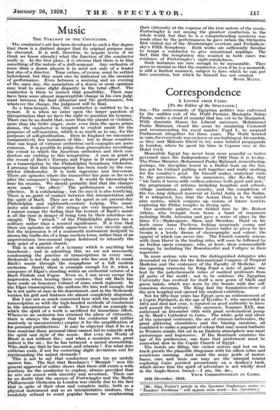Correspondence
A LETTER FROM CAIRO.
[To the Editor of the Sr-rem-rim]
SIR,—The serio-comedy of Egyptian politics was enlivened by the sudden exit of the Wafd Premier, Mustapha Nahas Pasha, under a cloud of scandal that has yet to be dissipated. With dramatic fitness his Liberal successor, Mohammed Pasha Mahmud, closed the scene by emulating Cromwell and recommending his royal master, Fuad I.. to suspend Parliament altogether for three years. The Wafd howled in vain, for everybody was on leave or sea-bathing at Alexandria, so they sent Makram Ebeid to try some belated propaganda in London, where he spent his time in Capuan ease at the Hotel Cecil.
Meanwhile Egypt has never been more peaceful or better governed since the Independence of 1922 than it is to-day. The Prime Minister, Mohammed Pasha Mahmud, remembering, perhaps, the discipline learnt in a Balliol boat on the Isis, has got his Cabinet pulling well together and really working for the country's good. He himself makes oratorical visits to the provinces, where he announces, like Ko-Ko, that " his brain it teems with endless schemes both good and new," the programme of reforms including hospitals and schools; village sanitation, public security, and the completion of the too long delayed reservoir at Gebel Aulia in the Sudan. It is whispered, too, that the Aswan Dam is to be raised nine metres, which conjures up visions of future tourists exploring the Philae temples in diving suits.
Our aesthetic palates were tickled first by Mr. Robert Atkins, who brought from home a band of mummers including Stella Arbenina and gave a series of plays by the three S's—Shakespeare, Shaw, and Sheridan. Hard on his heels came Anna Pavlova, looking amazingly young and adorable as ever : the Autumn Leaves ballet as given by her troupe is a lovely dream of choreography and colour, the appeal of which can never tire. The French comedy season, with Jean nerve in the leading roles, will soon be followed by an Italian opera company, who, at least, show commendable courage, by including the Rosenkavalier and Valkyrie in their repertoire.
In more serious vein were the distinguished delegates who descended on Cairo for the International Congress of Tropical Medicine and the centenary of the Faculty of Medicine. At the opening ceremony by King Fuad a note of gaiety was lent by the polychromatic robes of medical professors from all parts of the world : not to 'be outdone, the Egyptian University has evolved for itself a new gown of black and green bands, which was worn by the Senate with due self- conscious decorum. The King laid the foundation-stone of the new hospital and opened the medical exhibition. Not for fifty-four years has Egypt seen an enthronement of a Coptic Patriarch, as the age of Kyrillos V, who succeeded in 1874 and died last year, is reputed on good authority to have well passed the century. His successor, Yoannes XIX, was enthroned on December 16th with great ecclesiastical pomp in St. Mark's Cathedral in Cairo. The white, gold and silver of the episcopal vestments, the sea of crimson tarbooshes, the great glittering chandeliers and the blazing sunshine, all combined to make a pageant of colour that may sound barbaric to Western minds, but set in an Eastern atmosphere was most picturesque and impressive. If His Beatitude emulates the age of his predecessor, one fears that preferment must be somewhat slow in the Coptic Church of Egypt.
The hotels are filling, the visitor arrives and hot on his track prowls the plausible dragoman with his silken robes and avaricious cunning. And amid the noisy jostle of motor- buses, cars and taxis, one may seethe intrepid tourist exploring Cairo perched precariously On a donkey's back, which shows that the spirit of adventure' is not wholly dead in the Anglo-Saxon breast.—I am, Sir, &c.,








































 Previous page
Previous page